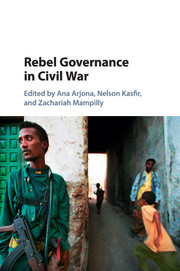Book contents
- Half title page
- Title page
- Copyright page
- Contents
- Contributors
- Book part
- 1 Introduction
- 2 Rebel Governance – Constructing a Field of Inquiry: Definitions, Scope, Patterns, Order, Causes
- 3 Del Gobierno de Abajo al Gobierno de Arriba …and Back: Transitions to and from Rebel Governance in Latin America, 1956–1990
- 4 Performing the Nation-State: Rebel Governance and Symbolic Processes1
- 5 Rebel Diplomacy: Theorizing Violent Non-State Actors’ Strategic Use of Talk
- 6 Rebel Governance During the Greek Civil War, 1942–1949
- 7 Comparing Rebel Rule Through Revolution and Naturalization: Ideologies of Governance in Naxalite and Naga India
- 8 Myths Set in Motion: The Moral Economy of Mai Mai Governance
- 9 Civilian Resistance to Rebel Governance1
- 10 Dialogue Direct:Rebel Governance and Civil Order in Northern Côte d’Ivoire
- 11 The Rebel State in Society: Governance and Accommodation in Aceh, Indonesia1
- 12 Organization and Governance: The Evolution of Urban Militias in Medellín, Colombia
- 13 Predatory Rebellions and Governance: The National Patriotic Front of Liberia, 1989–1992
- 14 Conclusion
- Index
- References
2 - Rebel Governance – Constructing a Field of Inquiry: Definitions, Scope, Patterns, Order, Causes
Published online by Cambridge University Press: 05 October 2015
- Half title page
- Title page
- Copyright page
- Contents
- Contributors
- Book part
- 1 Introduction
- 2 Rebel Governance – Constructing a Field of Inquiry: Definitions, Scope, Patterns, Order, Causes
- 3 Del Gobierno de Abajo al Gobierno de Arriba …and Back: Transitions to and from Rebel Governance in Latin America, 1956–1990
- 4 Performing the Nation-State: Rebel Governance and Symbolic Processes1
- 5 Rebel Diplomacy: Theorizing Violent Non-State Actors’ Strategic Use of Talk
- 6 Rebel Governance During the Greek Civil War, 1942–1949
- 7 Comparing Rebel Rule Through Revolution and Naturalization: Ideologies of Governance in Naxalite and Naga India
- 8 Myths Set in Motion: The Moral Economy of Mai Mai Governance
- 9 Civilian Resistance to Rebel Governance1
- 10 Dialogue Direct:Rebel Governance and Civil Order in Northern Côte d’Ivoire
- 11 The Rebel State in Society: Governance and Accommodation in Aceh, Indonesia1
- 12 Organization and Governance: The Evolution of Urban Militias in Medellín, Colombia
- 13 Predatory Rebellions and Governance: The National Patriotic Front of Liberia, 1989–1992
- 14 Conclusion
- Index
- References
Summary
Rebels frequently form governments for civilians living in areas they hold during civil war. Since the causes and structures of these governments vary considerably, they present an underexploited opportunity for comparative analysis. Building a subject area of rebel governance, as for any other field, means finding its boundaries, determining which activities by insurgents amount to governance, deciding which structures and actions to include, and deciding the basis on which differences among them should be evaluated. The first steps are to define rebel governance and establish the scope conditions that indicate which rebel organizations are capable of governing, whether they do so or not. A broad definition of rebel governance is organizing civilians for a public purpose. Three scope conditions are territorial control, a resident population, and violence or threat of violence. Insurgents who form governments organize civilian participation, civilian administration, or civilian production of wealth. Rebel governance sometimes results in rebel political order. The parameters of this new field provide preliminary categories for identifying causes that shape rebel governance. The distinction between exogenous causes that lead rebels to begin civil wars and endogenous factors that affect rebels after their wars begin is probably one of the most important.
- Type
- Chapter
- Information
- Rebel Governance in Civil War , pp. 21 - 46Publisher: Cambridge University PressPrint publication year: 2015
References
- 82
- Cited by



